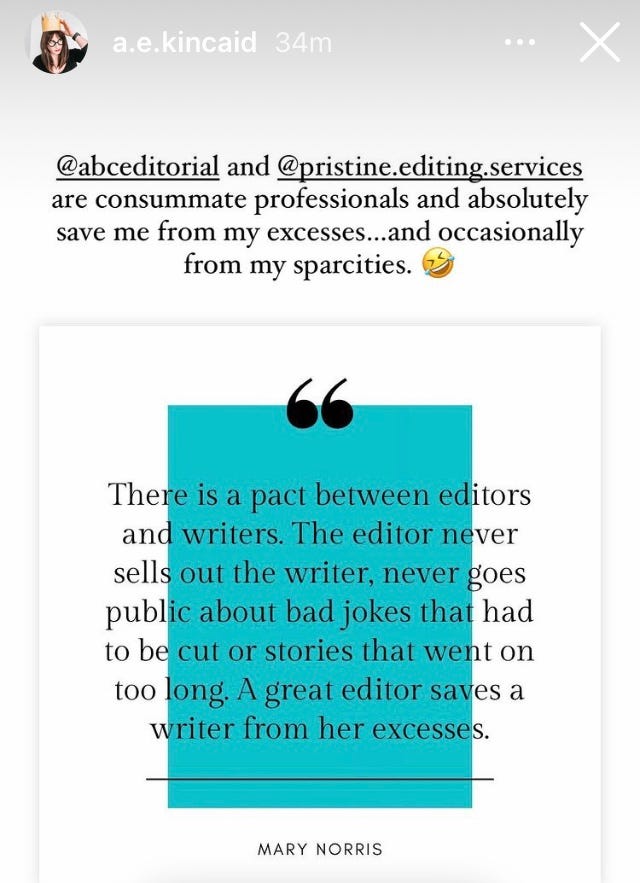Hot Tip for Writers Who Want to Raise Rates
The tool I use to make smart, informed rate increases
Hey, freelance writers. It’s not too late to raise your rates for 2024. Before you send that email to your clients notifying them of changes, do this first:
Add data about past projects to your email. Data will make your clients clear on the benefits they’ve gotten from you and therefore happy that they’ve invested in you—and eager to keep the collaboration going.
To get the data you need …
Track every piece of content for every client.

Photo by
on
Easy Tracking
Tracking is not time-consuming, especially if you do it from the get-go. (I once made a tracker after a year of working with a client and scoured every invoice between us to record the data.)
I use a simple Google Sheet, which you can find at the bottom of this post.
For every blog post I write for a Wall Street Journal–bestselling author, I note:
➡ the date
➡ was the idea mine or the client’s?
➡ time spent writing
➡ time spent revising
➡ was it published? (if not, why not)
➡ how did it perform?
**If you don’t have access to performance metrics, get creative! I don’t have access to metrics for this client, but I do note which blog posts make the author’s Top Articles webpage, for example.**
This data will help you understand your value and see smart ways to increase your rates or change your packages.
I’ve used my tracker to support switching from an hourly rate to flat fee, increasing rates, and changing offers.
Recently I increased my flat fee 43% by including 90 minutes of revisions compared to 30 minutes previously.
My tracker showed that in 2+ years with this client, only a handful of blog posts needed 90+ minutes of revisions. The majority of blog posts needed 30 minutes or less of revisions, if any. Less than 20% needed between 30 and 90 minutes of revisions.
So I could increase my flat fee while offering the client a great benefit I knew they wouldn’t often need. Which means I earn more without always working more.
https://media.giphy.com/media/N7LUQBiVLUItW/giphy.gif
Prepare to Negotiate
Did the author push back on the new fee? They did. The rate increase was, after all, significant.
But here’s another piece of freelance wisdom I’m learning to accept, albeit nervously: Clients challenging your rates is good. You should aim to reach their budget limits and get pushback.
When I had proposed a rate increase to the author a year prior, the rate wasn’t as high as I wanted it to be. I was scared to ask for too much. Yet the author accepted it without question, and I spent the rest of the year kicking myself for not asking for more.
This has been a sad pattern throughout my six-year freelance career.
Now I’m trying to get more comfortable with charging uncomfortably high. I feel more comfortable doing so when I have the data to show my work is worth that rate.
I want my rate increases to invite negotiation, even though I don’t enjoy it.
Negotiation is not my strong suit, and my clients are very smart and successful. Negotiating with them is intimidating.
When the author pushed back on my rate increase recently, they asked me to reiterate why the increase was so high. We discussed variations to what was included in the flat fee:
blog post, plus 90 minutes of free revisions
blog post, plus 30 minutes of free revisions, plus social media posts for each blog post (which would save the author the cost of paying someone else to do it)
Here, too, the tracker came in handy. I used it to advocate for the offering that would work best for both of us. I showed the author the value they would get from 90 minutes of revisions and, alternatively, the value from including social media posts.
Notably, I used the tracker to reject a variation that didn’t work for me. The author proposed using the 90 minutes to do the revisions and allocating any leftover time for social media. But my tracker showed that drafting a blog post sometimes takes me longer than expected and cuts into the time for revisions. It didn’t make sense to pack too much into a flat fee.
When I showed the client the data, they understood.
Ultimately, the author settled on the original offer I had made and even asked me to do a trial period of writing social media posts, paid by the hour.
The negotiations were a journey, but worth it.
**I’m sure there are much fancier trackers out there, but if you’re in Google Suite all day as I am, then feel free to copy the tracker I use.**
Enjoy this post? Buy me a coffee in support.
Hi, I’m Jaime, editor and owner of Pristine Editing LLC. To get to know me better, and for more editing tips, sign up for my quarterly email newsletter! You can also follow me on LinkedIn and Instagram. And don’t miss out on my free style guide template.
The Sanctity of the Writer-Editor Relationship
There’s an unspoken pact between writers and editors.

Photo by
on Unsplash
Recently I rewatched Mary Norris’s Ted Talk—for possibly the 20th time—and, as always, a new gem stood out to me. Norris, former New Yorker copy editor, touched on the writer-editor relationship:
There is a pact between editors and writers. The editor never sells out the writer, never goes public about bad jokes that were cut or stories that went on too long. A great writer saves an editor from her excesses.
Listening to this quote had me nodding along in agreement, and it made me want to explore the writer-editor relationship further for the sake of my clients—or for potential future clients who are currently hesitant about working with an editor.
Writers, especially new writers, may think that sharing their work with an editor will “out” them as a…bad writer. Someone who doesn’t deserve to be among the ranks of those who call themselves scribes.
That’s why I want to share a key lesson I learned early on in my career as an editor:
Everyone needs an editor. Everyone.
It matters not in the slightest whether you are a naturally strong writer or even a great editor! Whatever you wrote can be improved by another pair of eyes, and further still by a pair of professional eyes. I’ve been a professional editor for eight years, and I still ask others for feedback and edits on important work.
As someone who also writes, I take great comfort from this lesson. I no longer fear criticism of my written work because I know every writer receives criticism. It’s just part of the process.
I’m not embarrassed by the “faults” in my writing because I’ve seen it all as an editor—and I am being completely honest when I say that I don’t judge as I edit. I never think, Oh, jeez, a dangling modifier, don’t they know anything about syntax? or Wow, that’s a major plot gap, how could they have missed something so egregious?
Furthermore, I never assume writers don’t know the rules of grammar, spelling, punctuation, etc., if their work includes such an error.
Editors know that writers encounter all kinds of obstacles in the writing process: deadlines, heavy workload, lack of inspiration, low expertise in the topic, simply having lived with a piece of work too long to be able to see it clearly…
The act of writing is challenging. What’s more, writing and editing use two different brain modes, as Anupam Krishnamurthy says in his post “Separate your writing from your editing”:
Our brain alternates between working in the diffuse mode and the focused mode. The diffuse mode is responsible for open, creative thinking.… The focused mode…helps us determine logic, structure and sequence.… For a given task, the brain can be either in the focused mode or the diffused mode. Mixing up our writing and editing causes us to switch between these two modes, breaking the flow of our thought.
For writers to get the words on the page, they have to release the unrealistic goal of making it perfect the first time around.
What writers need to know about editors is that we have a profound respect for you. Because it takes determination and creativity to write. Editors react to the text. Writers create it from nothing.
This lays the foundation for the writer-editor relationship.

A little client love from a book author
The editor never sells out the writer because that would just be…blind to the writing process.
The writing process is a cycle of prewriting, drafting, revising, and editing on repeat until the work is the best version it can be.
Just as our private thoughts are not who we really are, incomplete drafts do not determine the writer. What matters is what we put out into the world: the final draft.
Editors understand that, which is why it doesn’t faze us to make even hefty changes and suggestions to a writer’s work—be it a manuscript, blog post, thought piece, anything.
Some writers may struggle with the idea of ownership when it comes to their work. If an editor gives me tons of feedback or makes lots of changes, is the work even my own at that point?
Yes, it is.
The writer is the creator, and the editor is the reactor. And the editor will never share what the excesses, gaps, or errors were in the drafts because, frankly, it doesn’t matter.
Hi, I’m Jaime, editor and owner of Pristine Editing LLC. To get to know me better, and for more editing tips, sign up for my quarterly email newsletter! You can also follow me on LinkedIn and Instagram. And don’t miss out on my free style guide template.